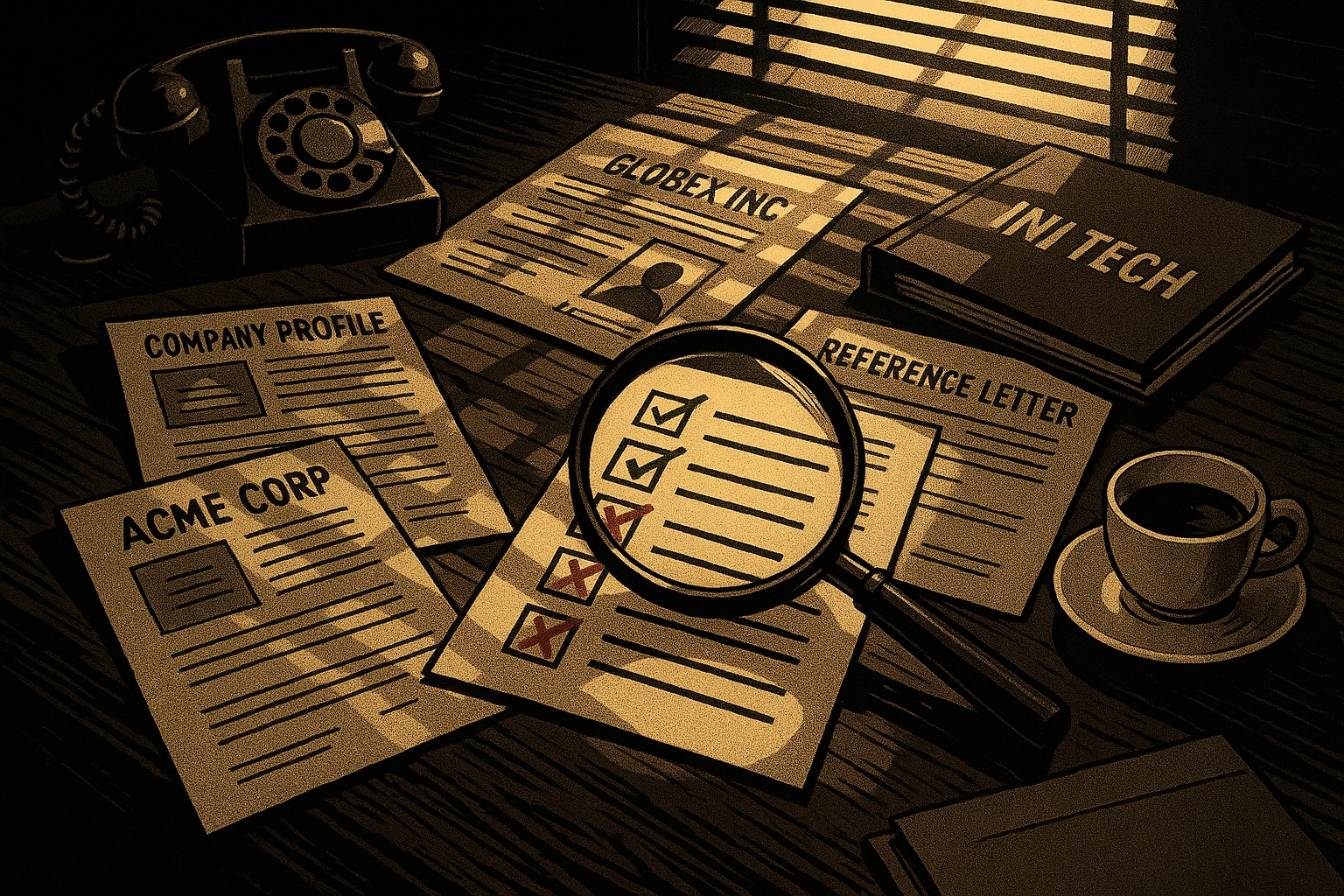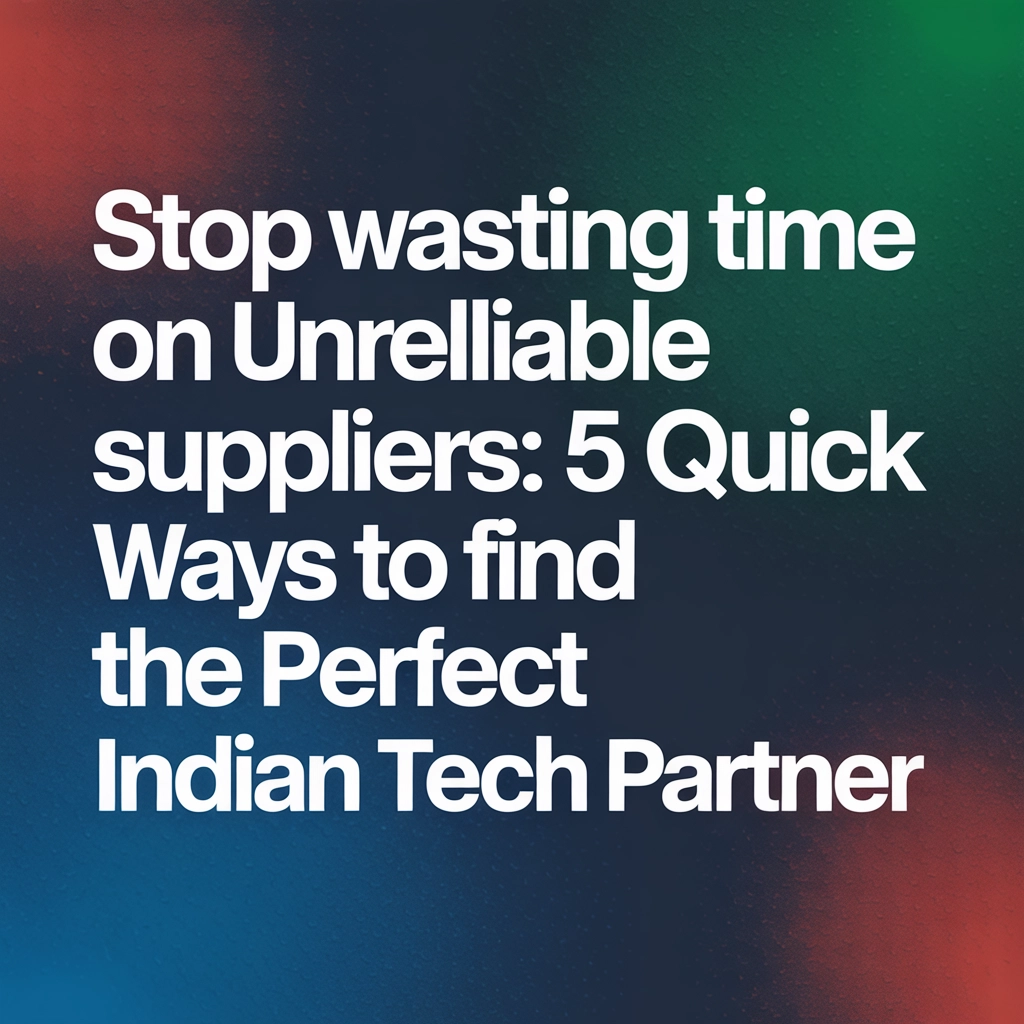Let's be honest – you've probably been burned by unreliable suppliers before. Maybe a shipment arrived late, quality was subpar, or communication just fell apart halfway through your project. It's frustrating, expensive, and frankly, a huge waste of your time.
The good news? India's tech sector is booming with world-class partners who can actually deliver on their promises. The challenge is knowing how to separate the wheat from the chaff. After helping hundreds of companies navigate this landscape, we've identified five proven methods that cut through the noise and connect you with suppliers who'll actually make your life easier.
1. Tap Into Industry Networks (Your Secret Weapon)
Here's what most people get wrong – they start their search on Google. Big mistake. The best Indian tech partners aren't necessarily the ones with the flashiest websites or biggest SEO budgets.
Instead, start with industry networks and trade organizations. These groups maintain curated lists of vetted suppliers who've already passed initial screening processes. Think of it as having someone else do the heavy lifting for you.
Where to look:
- Industry-specific trade associations in both Israel and India
- Professional networks like LinkedIn groups focused on tech sourcing
- Chamber of commerce directories
- Trade show attendee lists from major tech events

The beauty of this approach is that you're getting real recommendations from people who've actually worked with these suppliers. No marketing fluff, just honest feedback from peers who understand your challenges.
Pro tip: Join 2-3 relevant LinkedIn groups and spend a week observing conversations. You'll quickly identify which suppliers get mentioned positively and which ones… don't.
2. Focus on Technical Expertise (Not Just Promises)
Every supplier claims to be "cutting-edge" and "innovative." Your job is to dig deeper and verify these claims with concrete evidence.
Start by asking for detailed case studies of projects similar to yours. Don't just accept glossy PDFs – ask for specifics. What technologies did they use? What challenges did they overcome? Can you speak directly with the project manager who handled it?
Key questions to ask:
- What certifications do your technical team members hold?
- Can you show me examples of similar projects you've completed in the last 12 months?
- How do you stay current with emerging technologies?
- What's your approach to problem-solving when technical challenges arise?
Look for partners who demonstrate genuine expertise in areas that matter to your business – whether that's AI, cloud computing, IoT, or any other technology that's critical to your success.
The best suppliers won't just execute your requirements; they'll offer suggestions and improvements based on their experience. That's the kind of partnership that actually adds value to your business.
3. Do Your Homework on Reputation (It's Worth the Effort)
This step takes time, but it's absolutely crucial. You need to go beyond testimonials on their website and dig into real, verifiable feedback.
Your reputation research checklist:
- Request at least 3-5 references from recent clients
- Check online reviews across multiple platforms
- Look up their company on industry forums and discussion boards
- Verify any awards or certifications they claim to have
- Check their financial stability through business databases

When you contact references, ask specific questions: Were deliveries on time? How did they handle problems? Would you work with them again? Listen for hesitation or diplomatic language that might indicate underlying issues.
Red flags to watch for:
- Reluctance to provide references
- References that are more than two years old
- Vague or overly positive testimonials that lack specifics
- No verifiable online presence or mixed reviews
Remember, a few negative reviews aren't necessarily deal-breakers – every company has bad days. But patterns of similar complaints should definitely raise concerns.
4. Test Communication Early and Often
Poor communication kills more sourcing relationships than any other factor. The good news is that communication issues usually surface early if you know what to look for.
Start by evaluating how potential partners handle your initial inquiries. Are they responsive? Do they ask thoughtful questions about your requirements? Do they seem to understand your business context, or are they just trying to close a deal?
Communication red flags:
- Delayed responses to emails or calls
- Generic, template-style responses that don't address your specific questions
- Reluctance to schedule video calls or face-to-face meetings
- Difficulty understanding your requirements despite multiple explanations
- Overly aggressive sales tactics or pressure to sign quickly

Cultural fit matters too, especially for long-term partnerships. Look for suppliers who make an effort to understand your business culture and working style. The best Indian tech partners we work with have developed strong cross-cultural communication skills that make collaboration seamless.
Pro tip: Schedule a video call early in the process. You'll learn more about their communication style in 30 minutes than you will from weeks of email exchanges.
5. Start Small, Think Big
Here's the mistake that costs companies millions: jumping into large-scale partnerships without testing the waters first.
Always start with a pilot project or small order. This gives you a low-risk way to evaluate their capabilities, communication style, and reliability before committing significant resources.
What to test in your pilot project:
- Quality of deliverables
- Adherence to deadlines
- Communication frequency and clarity
- Problem-solving approach when issues arise
- Overall project management capabilities

A good pilot project should be representative of larger work you might do together, but small enough that failure won't seriously impact your business. Think 10-15% of what you'd eventually want to source through them.
The suppliers who excel during pilot projects usually continue that performance at scale. Conversely, if they struggle with small projects, they're definitely not ready for larger commitments.
Setting up for success:
- Define clear success metrics upfront
- Establish regular check-in schedules
- Document everything for future reference
- Be prepared to walk away if performance doesn't meet expectations
The Quality and Security Factor
Before we wrap up, let's talk about two critical factors that often get overlooked: quality assurance and data security.
Quality shouldn't be an afterthought. Look for suppliers who have established quality management processes, not just promises. Ask to see their quality control procedures, testing protocols, and how they handle quality issues when they arise.
Data security is equally important, especially if you're sharing sensitive technical specifications or business information. Verify that potential partners have robust security measures including:
- Encryption protocols for data transmission and storage
- Access controls and user authentication systems
- Regular security audits and compliance certifications
- Clear data handling and privacy policies

Your Next Steps
Finding reliable Indian tech partners doesn't have to be a frustrating process of trial and error. By following these five methods, you'll significantly improve your odds of finding suppliers who actually deliver on their promises.
Remember, the goal isn't just to find the cheapest option – it's to find partners who'll make your business more successful. Sometimes that means paying a bit more upfront for suppliers who'll save you time, stress, and money in the long run.
The Indian tech sector offers tremendous opportunities for companies willing to do their homework and build genuine partnerships. Take the time to vet suppliers properly, and you'll reap the benefits for years to come.
Ready to stop wasting time on unreliable suppliers? Start implementing these strategies today, and you'll be amazed at the difference proper supplier selection makes to your bottom line and peace of mind.




